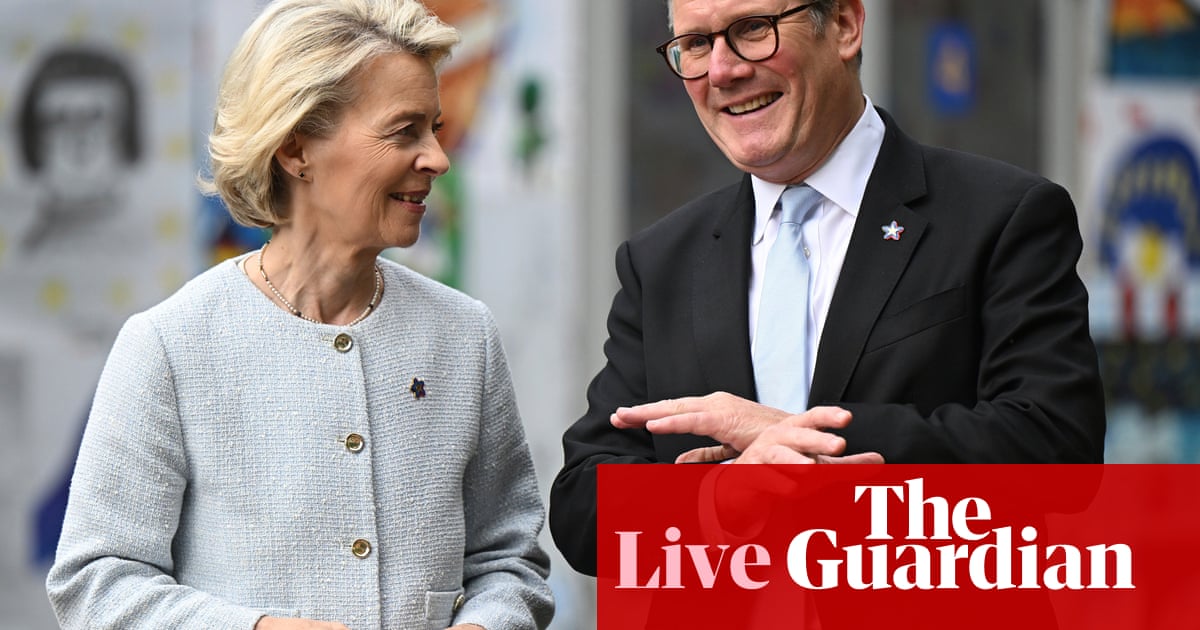The BBC has meanwhile reported a breakthrough in EU-UK talks, citing government sources. We’ll bring you more when we have them.
The talks were taking place over the weekend ahead of a key summit hosted byKeir Starmerwith EU leaders aimed at resetting the UK’s relationship with the bloc five years after Brexit.
The talks were aimed at striking a deal to be signed at the summit andhad gone down to the wireto resolve squabbling over long-standing issues, including fishing rights and a youth mobility scheme.
An agreement would mark a symbolic step in turning the page on the animosity that followed Britain’s exit from the bloc in January 2020.
No 10’s decision toissue a press statementon Saturday presenting the summit as a done deal caused irritation in Brussels, prompting some to recall the mantra of Brexit negotiations: “Nothing is agreed until everything is agreed.”
The Guardian’s political editor, Pippa Crerar, reports that there was indeed a breakthrough in EU-UK talks last night but that “there are still some steps to take”.
The BBC has meanwhile reported a breakthrough in EU-UK talks, citing government sources. We’ll bring you more when we have them.
The talks were taking place over the weekend ahead of a key summit hosted byKeir Starmerwith EU leaders aimed at resetting the UK’s relationship with the bloc five years after Brexit.
The talks were aimed at striking a deal to be signed at the summit andhad gone down to the wireto resolve squabbling over long-standing issues, including fishing rights and a youth mobility scheme.
An agreement would mark a symbolic step in turning the page on the animosity that followed Britain’s exit from the bloc in January 2020.
No 10’s decision toissue a press statementon Saturday presenting the summit as a done deal caused irritation in Brussels, prompting some to recall the mantra of Brexit negotiations: “Nothing is agreed until everything is agreed.”
Hello and welcome to our live coverage of the day after pivotal elections inPortugal, Romania and Poland.
Here’s a quick recap of where we stand:
ROMANIA: The centrist mayor of Bucharest,Nicuşor Dan, has won Romania’s presidential election with 54% of the vote, eight points clear of his far-right rival,George Simion.
Dan had cast the second round vote as a battle between “a pro-western and an anti-western Romania”. The capital’s two-term mayor, who made his name fighting corrupt property developers, said voters seeking “profound change, functioning state institutions, less corruption, a prosperous economy and a society of dialogue, not hate, have won”.
Simion, a self-professed Trump-admirer, conceded early on Monday, after earlier claiming he had won the election. “We may have lost a battle, but we will certainly not lose the war,” he posted on X.
PORTUGAL: Portugal’s incumbent, centre-right Democratic Alliance (AD) has won the country’sthird snap general election in three yearsbut once again fallen well short of a majority, while the far-right Chega party has recorded a record result and is vying for second place with the Socialist party (PS).
Votes from abroad, which will be counted in the coming days, could still put Chega in second place, which would be the first time in almost 40 years that the Socialists do not finish in the top two spots.
By midnight on Sunday, with 99% of the votes counted, the AD – led by the prime minister,Luís Montenegro– had won 32.1% of the vote and taken 86 seats in Portugal’s 230-seat assembly. It needed 116 for a majority. The Socialists had taken 23.4% of the vote t0 Chega’s 22.6%, and the two were tied on 58 seats each.
POLAND: The pro-European centristRafał Trzaskowskiand historianKarol Nawrocki, backed by the populist right,each secured about 30% of the votein a nail-bitingly close first round of Poland’s presidential election.
The vote sets the stage for a runoff round in two weeks that will force voters to choose between starkly different visions of the country’s future.
An exit poll by the Ipsos institute released as voting closed on Sunday, suggested Trzaskowski, the mayor of Warsaw and candidate from the prime ministerDonald Tusk’s Civic Coalition, had claimed 30.8% of the vote in the first round. Trailing him was Nawrocki, who has been endorsed by the Law and Justice party (PiS), with 29.1% of the vote.
